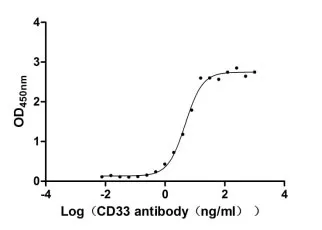Recombinant Human Myeloid cell surface antigen CD33 (CD33) , partial (Active)
CAT:
399-CSB-MP004925HU-01
Size:
20 µg
Price:
Ask
- Availability: 24/48H Stock Items & 2 to 6 Weeks non Stock Items.
- Dry Ice Shipment: No
















Recombinant Human Myeloid cell surface antigen CD33 (CD33) , partial (Active)
CAS Number:
9000-83-3Gene Name:
CD33UniProt:
P20138Expression Region:
18-259aaOrganism:
Homo sapiensTarget Sequence:
DPNFWLQVQESVTVQEGLCVLVPCTFFHPIPYYDKNSPVHGYWFREGAIISRDSPVATNKLDQEVQEETQGRFRLLGDPSRNNCSLSIVDARRRDNGSYFFRMERGSTKYSYKSPQLSVHVTDLTHRPKILIPGTLEPGHSKNLTCSVSWACEQGTPPIFSWLSAAPTSLGPRTTHSSVLIITPRPQDHGTNLTCQVKFAGAGVTTERTIQLNVTYVPQNPTTGIFPGDGSGKQETRAGVVHTag:
C-terminal hFc-Myc-taggedSource:
Mammalian cellField of Research:
CancerAssay Type:
Active Protein & In Stock ProteinRelevance:
Sialic-acid-binding immunoglobulin-like lectin that plays a role in mediating cell-cell interactions and in maintaining immune cells in a resting state . Preferentially recognizes and binds alpha-2, 3- and more avidly alpha-2, 6-linked sialic acid-bearing glycans . Upon engagement of ligands such as C1q or syalylated glycoproteins, two immunoreceptor tyrosine-based inhibitory motifs located in CD33 cytoplasmic tail are phosphorylated by Src-like kinases such as LCK . These phosphorylations provide docking sites for the recruitment and activation of protein-tyrosine phosphatases PTPN6/SHP-1 and PTPN11/SHP-2 . In turn, these phosphatases regulate downstream pathways through dephosphorylation of signaling molecules . One of the repressive effect of CD33 on monocyte activation requires phosphoinositide 3-kinase/PI3K .Endotoxin:
Less than 1.0 EU/ug as determined by LAL method.Purity:
Greater than 95% as determined by SDS-PAGE.Activity:
YesBioactivity:
Measured by its binding ability in a functional ELISA. Immobilized CD33 at 2 μg/ml can bind Anti-CD33 rabbit monoclonal antibody, the EC50 of human CD33 protein is 4.289- 5.312 ng/ml.Length:
PartialForm:
Lyophilized powderBuffer:
Lyophilized from a 0.2 μm filtered PBS, 6% Trehalose, pH 7.4Reconstitution:
We recommend that this vial be briefly centrifuged prior to opening to bring the contents to the bottom. Please reconstitute protein in deionized sterile water to a concentration of 0.1-1.0 mg/mL.We recommend to add 5-50% of glycerol (final concentration) and aliquot for long-term storage at -20℃/-80℃. Our default final concentration of glycerol is 50%. Customers could use it as reference.Molecular Weight:
56.9 kDaStorage Conditions:
The shelf life is related to many factors, storage state, buffer ingredients, storage temperature and the stability of the protein itself. Generally, the shelf life of liquid form is 6 months at -20℃/-80℃. The shelf life of lyophilized form is 12 months at -20℃/-80℃.Protein Length:
Partial